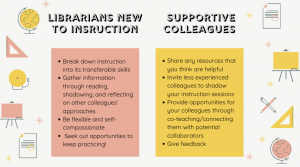By Stephanie Porrata, Mary P. Key Diversity Resident Librarian for Area Studies
Library instruction can be intimidating, especially for an early-career librarian with no prior knowledge or experience. This blog post will highlight my approach to library instruction as an early-career librarian through the process of preparing for my first instruction session. My goal is to provide a starting point for other librarians unfamiliar with instruction along with some insight as to how more experienced colleagues can support librarians like myself.
Pre-Instruction Preparation
One of the most helpful ways to cope with the intimidation of my first ever instruction session was to reduce it to its fundamental transferable skills—public speaking, knowledge of the library catalog, knowledge of the information cycle—and connect them to what I have already done. Upon reflection, I realized that my experience as a Residence Hall Library Supervisor coupled with my MLS class work and presentations were my connection points to library instruction. As a supervisor, it was my duty to familiarize my staff with the catalog so that they could connect students with the resources they sought. While these training sessions with my student workers were short and focused on a specific section of the libraries’ catalog, I was in fact doing some preliminary instruction. My MLS coursework involved many presentations and provided an opportunity to improve my public speaking, allowing me to feel —somewhat—confident in front of a crowd. Whenever my anxiety would spike about my upcoming instruction session, I would return to the idea that my upcoming instruction session is not a completely new experience.
With my anxiety under control, I moved into an information gathering phase involving asking for help getting started, shadowing colleagues, and doing my reading. Up until I started my position as an MPK Diversity Resident Librarian, I had very little familiarity with the literature on instruction and any guidelines for best practices. I reached out to our Teaching and Learning Engagement Librarian, explained my upcoming instruction session and lack of experience with instruction, and then she provided a suggested reading list based off our conversation. With this reading list in hand, I felt more comfortable going into my instruction session with some kind of best practice road map. At the same time, I made sure to shadow my colleagues’ instruction sessions whenever I could. By watching I could see first-hand what is effective and what is connecting with students. It is also helpful to see the kinds of questions, comments, and activities my colleagues used to engage with students and their learning. Taking notes of these sessions provided me with a toolkit of ideas to draw on when it was time to do my own instruction session. At this point in the preparation process, I was feeling pretty confident. I created my PowerPoint and had several practice runs with my supervisor, asking for any comments or suggestions. I was ready to present!
Post-Instruction Reflections
I survived my first instruction session which was in collaboration with two other librarians and learned a valuable lesson in flexibility and self-compassion. As with anything in life, you can prepare extensively and something will still stray from the plan. In this situation the straying factor was my allotted time. Because I was last to go, my allotted 25 minutes became 14 minutes. My 25 minutes of content had to become 14 minutes of content on the spot. I did the best I could, but there was no denying that I was a little distressed. I did not get to cover everything I wanted to cover and I felt like I did not do my job well. Upon reflection, I realized that flexibility and improvisation are vital skills if you are going to be doing instruction sessions. The ability to adjust according to your environment—timing changes, audience feedback, etc.— is dynamic and engaging and something that can only improve with practice. While I may not have handled the situation with as much grace as I would have liked, I was able to practice some self-compassion. Things did not go according to plan, and that was okay. I walked away with some experience under my belt and an understanding that sometimes things do not go according to plan. Doing instruction is an iterative process that calls for constant research and preparation, flexibility and reflection.
Here are some takeaways based on my experience:
